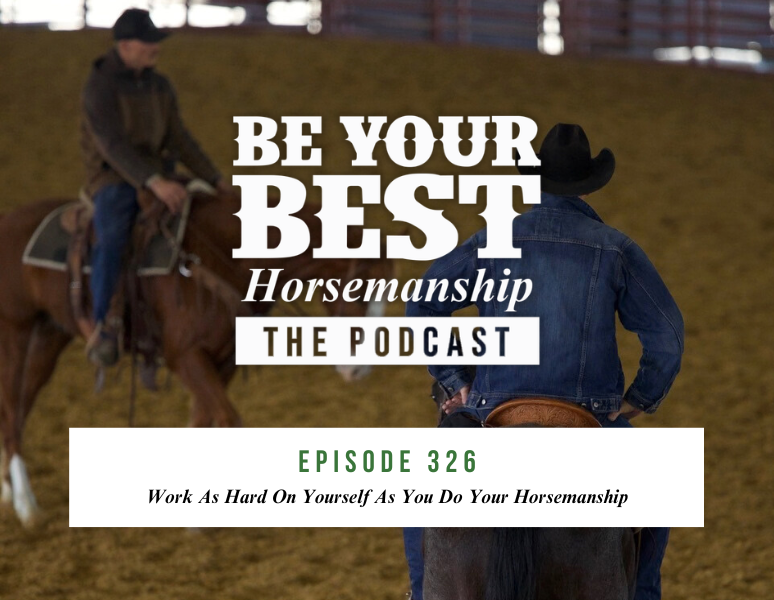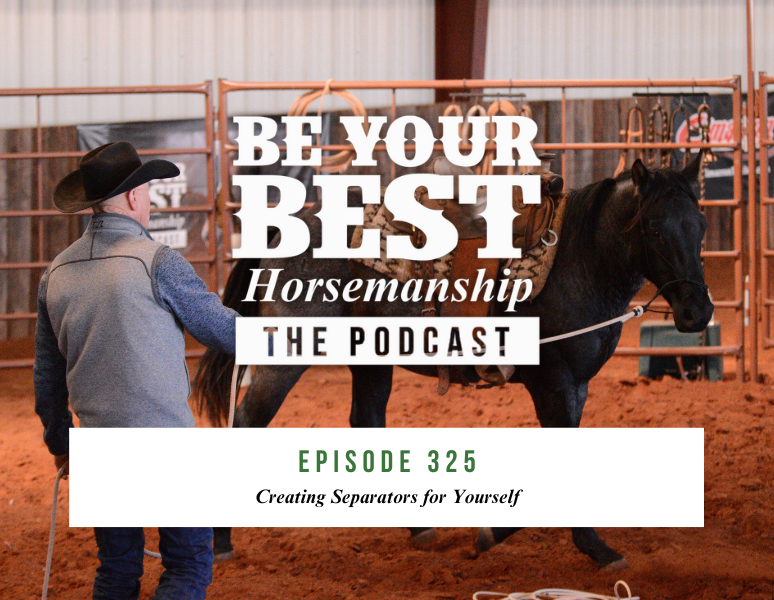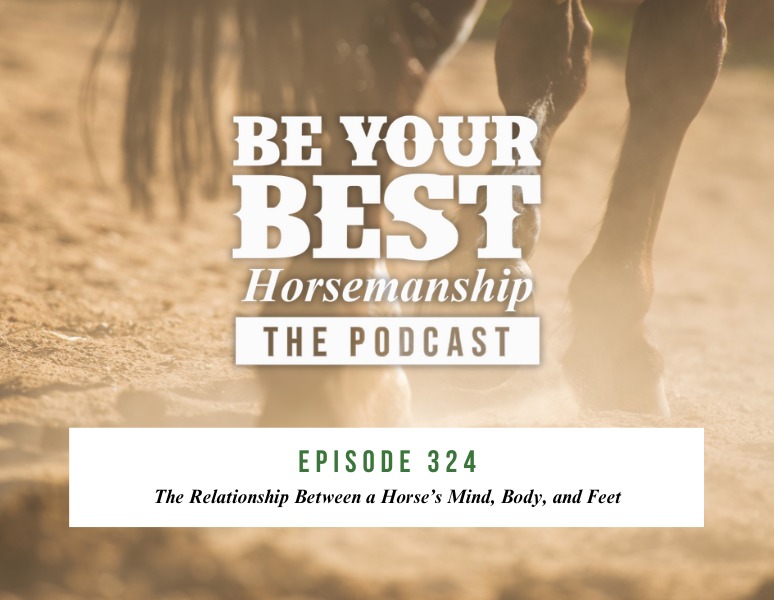Ep 180: How to Overcome Feelings of Inadequacy
If you’ve listened to this podcast before or been involved with one of my online training programs or clinics, you know that I always preach about the importance of understanding the horse’s mind and how it operates.
If you’re new here, I’ll give you a quick summary:
A horse’s mind has two thought processes–thinking and reacting. A horse’s mind can only occupy one of these thought processes at a time. When a horse is reactive, it cannot engage the ‘thinking’ side of its brain. When a horse is ‘thinking,’ they are less likely to be reactive. As trainers, it is our job to help the horse engage the ‘thinking’ side of its brain so that they can grow and progress in their training.
The same theory is true for the human mind.
The human mind can only occupy one thought at a time–good or bad, positive or negative. In order to progress, we need to engage the positive thought processes more often than the negative ones.
I always say, “our horses are not going to change unless we change first.”
Well, the same is true about life and our thoughts.
Life is not going to change unless we change first.
If we want to continue growing and improving in any area of our lives, we must learn to control and reroute our negative thoughts.
Rerouting Negative Thought Patterns
As we grow and progress through various endeavors in life, it is inevitable that we will eventually be met with negative thoughts from time to time. No matter how good you are at something or how much money you’ve earned, I believe there is no one who is immune to occasional thoughts and feelings of self-doubt and inadequacy. When this happens, there is a fundamental realization that we must accept:
We can’t control the first thought that comes into our minds, but we can control the second.
When those feelings of self doubt creep in, we can’t stop them from entering our minds. But, we can take immediate action to reroute those negative thoughts into something that reinforces a positive self image. This process is a common cognitive behavioral therapy (CBT) exercise known as catch-check-change.
Catch the thought – “I am aware that I am feeling inadequate right now.”
Check the thought – “Why am I feeling that way? Are the things that are making me feel this way 100% true?”
Change the thought – “I am not inadequate - I am just feeling discouraged right now.” Then, replace the negative thought with something positive, like an affirmation or gratitude.
The moral principle of this exercise is: don’t believe every thought you have.
Move Your Body, Change Your Mind
It’s no secret that we are all our own worst critics. When we experience a shortcoming in life, our minds instantly validate these shortcomings with thoughts of “I’m not good enough.” If we allow this thought to occupy our minds for too long, eventually, we will place the “inadequate” label on ourselves. Any time you enter a negative thought spiral, you have to develop the self awareness to catch yourself in your tracks, evaluate that thought process, and change it into something positive.
Tony Robbins is the type of person I like to refer to as a “monster motivator.” He is an expert on mental performance, and he talks about this process of rerouting your thoughts. His theory is that you must change your physical state in order to change your mental state. He preaches the science of getting moving so that you can change your mind.
When I’m feeling down, the easiest thing to do is to sit and wallow in my own thoughts. When those feelings of inadequacy hit, that also happens to be the moment when my motivation walks out the door. The time when I am feeling the least motivated to keep moving is the exact time when it is the most critical to keep moving. When that feeling hits, I have to discipline myself to do just one thing that reinforces a positive thought about myself. I have to get up, get moving, and complete one small action that reinforces the type of person I want to see myself as. I have to take that opportunity to prove those negative thoughts wrong.
The Acceptance of Undone To-Dos
One of the biggest mental blocks I’ve had to overcome in my life is the acceptance of undone to-dos. For years, I ended nearly every day feeling inadequate because I didn’t get everything crossed off my list for the day. It didn’t matter how late I stayed out and worked, I would still feel inadequate because I was left with undone to-dos. This thought spiral was stealing so much of my peace and joy that I couldn’t shut off my thoughts. I couldn’t walk inside the house and be present with my family. I couldn’t lay down at night and not worry about what I hadn’t gotten done that day. But one day, I finally decided enough was enough. I told myself, “You need to just pick a point in the day and stop.” The truth is, I was never going to get it all done. As soon as one to do list was complete, I would create another. I finally realized that, instead of focusing on what I didn’t do, I had to start focusing on what I did do that day. I had to celebrate what I did accomplish that day instead of dwelling on the list of tasks I left for the next day.
My personal development journey has been something that I have begun talking a lot more about in recent years. I’ve always had an appreciation for personal development on some level, but it wasn’t until the last five years or so that I really began to make this area of my life a priority. With all the studying I’ve done in personal development, I’ve learned that all success people have two things in common:
They all have mentors.
They all have accountability partners.
And these two things are not the same.
What to Look for in a Mentor
I have been blessed with many phenomenal mentors in my life, both in the personal development space and in the horsemanship world. When I look for a mentor, I look for these key attributes:
Someone who can give me an unbiased opinion and perspective
Someone who has a lot of experience in the area I am trying to get better in
Someone who radiates positivity, optimism and encouragement
I consider John Maxwell to be one of my top mentors, both in life and in business. John is an author, speaker and leadership coach who I consider to be an absolute wealth of knowledge. I followed along with John on his social media and email list for years, and I was also fortunate enough to complete his Leadership Certification program a few years ago. Even though I have listened to him for years, I swear every time he opens his mouth, I learn something new. John is the type of mentor everyone needs in their life–someone who you can always count on to give you a dose of inspiration and positivity.
See Phil’s list of recommended reads from John Maxwell below.
I also have tons of great mentors in the horsemanship industry. I have had mentors who I’ve trained with, attended clinics with, and simply watched and listened to over the years. Even though I always look for someone who has more experience than me, in my later years of life, it is becoming increasingly more difficult to find someone else who can exceed my years of training experience. However, I have learned that years of experience does not always equate to the quality of experience. In fact, I have a few mentors who are quite a few years younger than me. Even though they are younger than me, they may be more well-versed in a specific discipline than I am. And, I learn something new every time I ride with them.
What to Look for in an Accountability Partner
While mentors may offer some degree of accountability, I believe that you also need separate accountability partners to encourage you in your day to day actions. Ideally, this accountability partner is someone that you spend a lot of time around and someone who knows you very well, such as a friend, sibling, parent, spouse, or co-worker. When I am looking for an accountability partner, I am looking for:
Someone who is going to be honest with me, but in an encouraging way
Someone who is going to lift me up and make me believe in myself.
Someone who helps me feel better about myself simply by being around them.
The reason accountability partners are distinct from mentors is that your accountability partner doesn’t always have to be well-versed in the areas of life that you are trying to improve in. For example, if you are trying to start and grow a business, your mentor is going to be the person to give you the tactical skills and advice to earn revenue and create a profitable operation. Your accountability partner is going to be the person who picks you up and encourages you to keep going on the hard days.
Episode Resources
Mentorship with Phil Haugen
Be Your Best Membership - an online mentorship experience that combines the personal development and horsemanship resources to help you be your best everyday.
Phil Haugen Mentorship Program - a 4-day, in-person mentorship program hosted at the Haugen Training Facility that combines horsemanship, personal development, and business development* to create a foundation for personal and professional growth.
*Business and marketing development not included in all mentorship programs. Available by request.
Phil’s Recommended Reads**:
**Disclaimer: As an Amazon Associate, I may earn a small commission from qualifying purchases made through these links.
“Be Your Best Horsemanship” is brought to you by Silver Lining Herbs, Classic Equine, Martin Saddlery, Better Horses Network, Purina, Healthycoat, CINCH, Starbar, and Clarifly. These brands have been part of the Phil Haugen Horsemanship team for many years, and their products continue to play an integral role in the success of our performance horse training program. To support these brands, visit our Sponsors tab.




